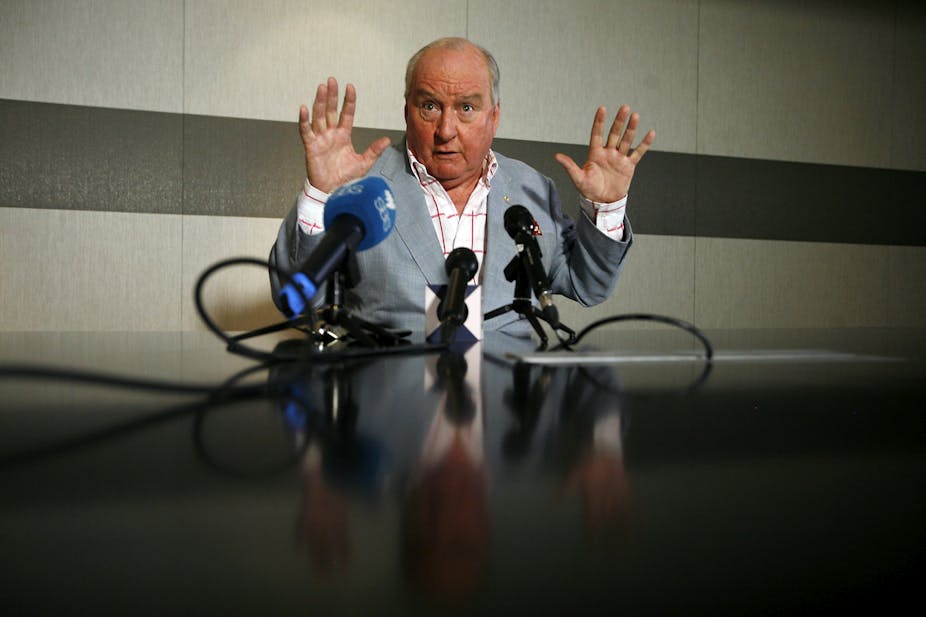The interesting part about this weekend’s kerfuffle over Alan Jones’ comments about the late John Gillard is not what Jones said.
After all, we’ve known about his combative - some would say offensive - nature since he incited ethnic violence at Cronulla in 2005, and his antipathy towards the Prime Minister has been evident since he called her “Ju-liar” to her face, live on air in 2011.
What is interesting is how the Prime Minister and politicians of all stripes (Tony Abbott notably excepted) have responded to his comments.
Although Jones says he has tried to make contact with Prime Minister Gillard to apologise, she’s not taking his calls. There’s been no public kiss-and-make up, no photo-op in which the two awkwardly share a cuppa and agree to let bygones be bygones. Some have interpreted the Prime Minister’s pointed silence as letting Jones know he’s gone too far this time, but I think it signals something much more significant.
I think the Prime Minister and the government have decided Jones just doesn’t matter that much anymore, and as a consequence, they’re no longer prepared to slavishly cultivate him in the way that all sides of politics have done for the past 15 years.
The good old days
It used to be said that Alan Jones could make or break governments — his breakfast show has enjoyed a long stretch as the number one ranking radio program in metropolitan Sydney and reaches thousands more around the country through syndication on rural and regional radio networks.
Paul Keating called Jones’ signature mix of outrage, political gossip, selectively-chosen statistics and man-on-the-street commentary “run of the mill fascism”, but for a period during the late 1990s and 2000s his was the show to be on if you wanted to be anyone in politics; his endorsement was the one you needed if you wanted to win over the taxi drivers, blue collar workers and pensioners of Australia.
The high-water mark of Jones’ influence was the latter end of the Howard years, when the Prime Minister would routinely snub “serious” media programs such as The 7:30 Report and Insiders in favour of yet another chat with Jones about how right his government was getting everything.
A changing landscape
Since the Howard government fell, Jones has attempted to maintain his influence by leading a vocal crusade against the carbon tax and other key Labor initiatives, even going so far as to support (and then serve as MC for) the embarrassing “convoy of no confidence” protest which sputtered into Canberra in August last year.
Yet for all his continued bluster from behind the microphone, Jones’ influence has steadily been eaten away by one simple fact: the ranks of those who listen to the radio are getting smaller and greyer by the year.
In 2006, Jones commanded an average daily listenership of 185,000 people in the Sydney catchment area alone. Six years later in 2012 this number is down to 151,000. His is still the number one rated show, but that’s because there are fewer people listening overall — the June 2012 Nielsen survey shows that all Sydney radio stations averaged just 469,000 listeners between them, out of a possible audience of 4.1 million.

It is also well known that Jones’ audience is older and more socially conservative than the general population — a 2006 study by Clive Hamilton found 68% of his regular listeners were aged 50 or older, and 65% had voted Liberal at the last election. When there were still a lot of people tuning in this didn’t matter too much, as the remainder of Jones’ audience was made up of younger blue-collar workers in outer suburban areas — the classic swing voters every party hopes to woo.
But over the past ten years many of these people have joined the ranks of the over-50s too, and they’re simply not being replaced by many new listeners. Younger people now get their news and current affairs primarily from television (both cable and free-to-air) and the internet, and there are a multitude of right-of-centre blogs, podcasts and news publications catering to those who would once have tuned in to Jones’ dulcet tones each morning.
Can Jones evolve his act?
Internationally, prominent US shock jocks such as Rush Limbaugh and Sean Hannity have bridged this generational divide by becoming cross-platform media stars — streaming and podcasting shows online for the digital-savvy, appearing as commentators on like-minded cable talk shows, and maintaining their own blogs and social media profiles. Jones has done none of this (perhaps put off by his spectacularly unsuccessful 1994 talk show) and so is gradually being marginalised by the march of time and media evolution.
If nothing else, the past weekend’s events suggest that Jones’ decline as a political force is now considered sufficiently terminal for the Prime Minister to take a principled stand against his foulness.
Where her predecessors may have thrown him a lifeline in the hope of building stronger relations — and therefore guaranteeing more favourable on-air treatment — Prime Minister Gillard has chosen to leave him adrift in the media storm his comments created.
Jones may not be a totally spent political force just yet, but if one of the most risk-averse and media-sensitive leaders Australia has ever seen is no longer scared of him, others aren’t likely to be for long, either.

